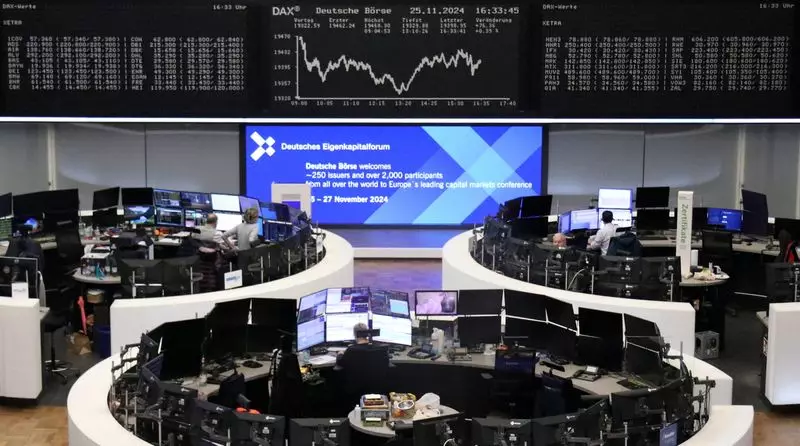European stock markets demonstrated remarkable stability on Thursday, maintaining a near one-month peak despite the political upheaval in France. Following a highly anticipated vote that resulted in the ousting of Prime Minister Michel Barnier, markets responded with a surprising degree of calmness, as evidenced by the 0.2% increase in the pan-European STOXX 600 index by 0945 GMT. This marks a continuous uptrend for six sessions, showcasing a strong resilience among European investors towards uncertain political climates.
The CAC 40, France’s flagship index, experienced a modest increase of 0.3%, briefly reaching a three-week high. However, these gains come amidst significant uncertainty as Barnier is slated to resign, a move that would position him as one of the shortest-serving prime ministers in recent French history. Observers note that France is now faced with the daunting prospect of concluding the year without a stable government, and the potential establishment of a budget for 2025 also hangs in the balance.
Commenting on the situation, Susannah Streeter, head of money and markets at Hargreaves Lansdown, emphasized that the equity markets’ muted reaction to the government collapse stems from the pre-existing expectations surrounding Barnier’s downfall. The forecasted turmoil, combined with constitutional provisions that could avert a drastic shutdown akin to those seen in the U.S., allowed investors to process the news without significant panic.
Interestingly, the risk premium associated with French debt saw a noticeable decline compared to German Bunds, dropping from its peak levels over the past 12 years. This shift indicates a level of investor confidence, likely predicated on the outlook for a timely resolution following Barnier’s departure from office.
France’s financial sector experienced upward momentum, with major banks like BNP Paribas, Societe Generale, and Credit Agricole rising between 1.7% and 2.8%. The overall positive sentiment was further buoyed by President Macron’s anticipated address to the nation, where he is expected to announce a successor, coinciding with a ceremonial reopening of the Notre-Dame Cathedral.
On the industrial front, notable movements included a robust 14% surge in shares of German copper producer Aurubis, spurred by a better-than-expected dividend proposition. Conversely, Shell’s shares dipped by 1% as the British oil major prepared to merge its offshore assets in the UK with those of Norway’s Equinor, prompting investor reassessment.
The French aerospace giant Safran encountered difficulties, experiencing a 4.9% decline in stock value after disclosing new financial objectives which appeared to underwhelm market analysts. In contrast, TotalEnergies saw a 1% uptick after RBC upgraded its outlook, underscoring the mixed dynamics at play within the sector amid political uncertainty.
European investors exhibited a notable resilience in the face of French political turmoil, brushing aside fears that often accompany government instability. The market’s response reflects not only a level of confidence in constitutional safeguards but also an acute awareness of the industry dynamics that govern stock performance. As political transitions unfold, the focus will remain on corporate earnings and broader market sentiment, highlighting the intricate relationship between governance and economic stability in Europe.

